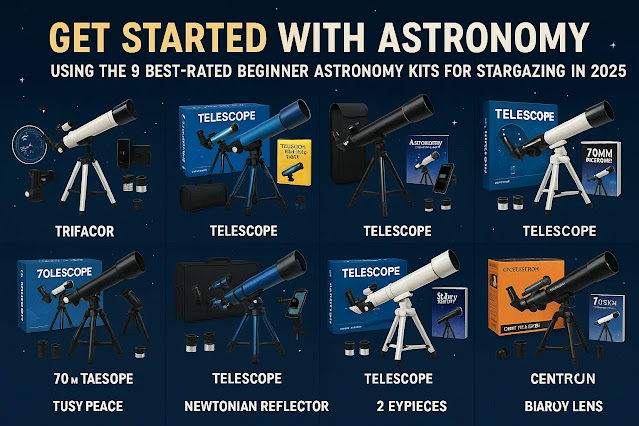Why Start Stargazing in 2025?
Astronomy has never been more accessible. Thanks to modern technology, affordable telescopes, and sky-mapping apps, anyone can begin exploring the stars right from their backyard. If you've always been curious about the Moon, planets, or even distant galaxies, a beginner astronomy kit is the perfect gateway to the cosmos.
Whether you're 12 or 60, astronomy can spark awe, fuel curiosity, and offer peaceful moments under the stars. The best part? You don’t need to be a scientist to get started.
What to Look for in a Beginner Astronomy Kit
Before investing in a kit, it’s essential to understand the components that make it useful and beginner-friendly.
Telescope Type
-
Refractors: Great for planetary views and easy to maintain
-
Reflectors: Better for deep-sky objects but may require more setup
-
Catadioptrics (Compound): Compact and versatile (usually pricier)
Mount Stability
Wobbly mounts make viewing difficult. Look for kits with:
-
Solid tripod construction
-
Altazimuth or Equatorial mounts for better tracking
Included Accessories
Good kits should come with:
-
Multiple eyepieces
-
Star maps or astronomy software
-
Barlow lenses
-
Smartphone adapters (optional but useful)
Learning Materials
Instructional guides, manuals, and access to online tutorials can ease the learning curve, especially for younger users.
Portability and Budget
A compact, lightweight kit encourages outdoor use and easier storage. Most beginner astronomy kits range from $100 to $300.
9 Best Beginner Astronomy Kits in 2025
Explore these top-rated kits tailored for new skywatchers.
1. Celestron AstroMaster LT 70AZ
-
Telescope Type: Refractor
-
Aperture: 70mm
-
Mount: Altazimuth
-
Best For: Moon, planets, and star clusters
Highlights:
Simple setup, sharp optics, and includes SkyX astronomy software.
✅ Reliable starter kit from a trusted brand
2. Orion StarBlast 4.5 Astro Reflector Kit
-
Telescope Type: Reflector
-
Aperture: 114mm
-
Mount: Tabletop Altazimuth
-
Best For: Deep-sky viewing
Highlights:
Wide field of view, sturdy design, great optics for the price.
✅ Compact but powerful
3. Meade Instruments Infinity 102AZ
-
Telescope Type: Refractor
-
Aperture: 102mm
-
Mount: Altazimuth
-
Best For: All-around performance
Highlights:
Large aperture, includes 3 eyepieces and Barlow lens, beginner-focused manual.
✅ Versatile and user-friendly
4. Gskyer AZ70400 Telescope Kit
-
Telescope Type: Refractor
-
Aperture: 70mm
-
Mount: Altazimuth
-
Best For: Budget-conscious beginners
Highlights:
Lightweight, comes with carrying bag, smartphone adapter, and tripod.
✅ Affordable and travel-ready
5. Celestron StarSense Explorer DX 80AZ
-
Telescope Type: Refractor
-
Aperture: 80mm
-
Mount: Manual Altazimuth with smartphone guidance
-
Best For: Tech-savvy beginners
Highlights:
Uses your phone to guide you to stars, planets, and galaxies—no WiFi needed!
✅ Smartphone-powered navigation
6. HEXEUM 70mm Portable Refracting Telescope Kit
-
Telescope Type: Refractor
-
Aperture: 70mm
-
Mount: Tripod AZ
-
Best For: Students and kids
Highlights:
Includes 2 eyepieces, moon filter, and wireless remote for smartphone photography.
✅ Best educational kit
7. National Geographic 114mm Newtonian Reflector Telescope
-
Telescope Type: Reflector
-
Aperture: 114mm
-
Mount: Equatorial
-
Best For: Advanced beginners
Highlights:
Good for lunar and planetary detail, includes sky maps and smartphone app support.
✅ Scientific and serious
8. Sarblue Mak60 with Travel Tripod
-
Telescope Type: Maksutov-Cassegrain
-
Aperture: 60mm
-
Mount: Tabletop tripod
-
Best For: Compact observation
Highlights:
Compact design, great for detailed moon viewing and travel.
✅ Portable and precise
9. Galileo G-80DB Starter Kit
-
Telescope Type: Dobsonian-style Reflector
-
Aperture: 80mm
-
Mount: Tabletop Dobsonian
-
Best For: Backyard stargazing
Highlights:
Stable, intuitive design with educational DVD included.
✅ Ideal for family use
Tips for Beginners Starting with Astronomy
Ideal Times to Observe the Night Sky
-
New Moon: Best for viewing faint stars and galaxies
-
Winter Skies: Crisp and clearer (less atmospheric turbulence)
Setting Expectations: What You’ll Really See
Don’t expect Hubble-quality photos. However, with the right beginner astronomy kit, you'll clearly see:
-
Craters on the Moon
-
Saturn’s rings
-
Jupiter’s moons
-
Star clusters and nebulae (with darker skies)
Best Astronomy Apps for Beginners
-
SkySafari
-
Star Walk 2
-
SkyView Lite
-
Night Sky (iOS)
These apps make it easy to identify stars, planets, and constellations by pointing your phone at the sky.
Frequently Asked Questions (FAQs)
1. What’s the best beginner astronomy kit for kids?
The HEXEUM 70mm or Gskyer 70400 kits are lightweight, affordable, and kid-friendly.
2. Can I use a beginner kit to see planets?
Yes! Most kits listed can show Jupiter’s bands, Saturn’s rings, and the Moon in detail.
3. Are tabletop telescopes effective?
Absolutely. Tabletop scopes like the Orion StarBlast and Galileo G-80DB are stable and powerful for their size.
4. Is smartphone compatibility necessary?
Not necessary but helpful. Some kits offer phone mounts or apps to assist in locating celestial objects.
5. What’s the best telescope type for beginners?
Refractor telescopes are generally easiest to use and maintain, making them ideal for beginners.
6. Do astronomy kits work in cities?
Yes, but light pollution limits visibility. Choose a kit with good aperture (80mm+) and use filters or apps to optimize performance.
Conclusion: Finding Your Ideal Beginner Astronomy Kit
Your first journey into the cosmos should be exciting—not overwhelming. That’s why choosing the right beginner astronomy kit is key. Whether you want something tech-forward like the StarSense Explorer or a budget-friendly classic like the Celestron AstroMaster, there’s a perfect setup for you.
🔭 The universe is waiting. Get your kit and start exploring tonight.
🌌 For more telescope reviews and tips, check out Astronomy.com






0 Comments